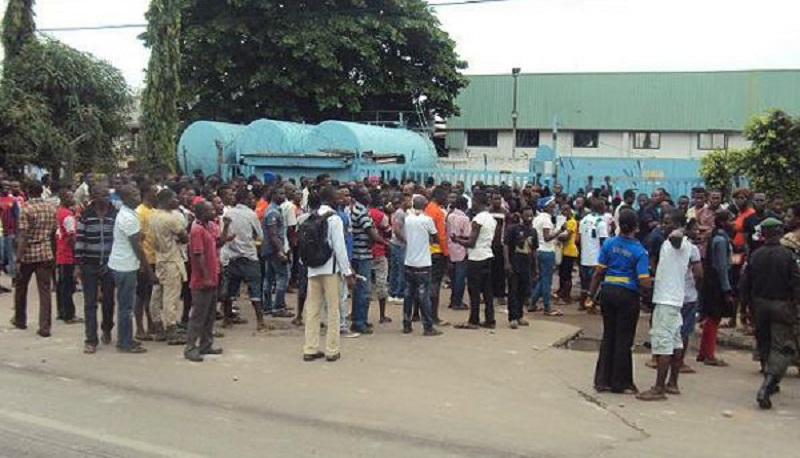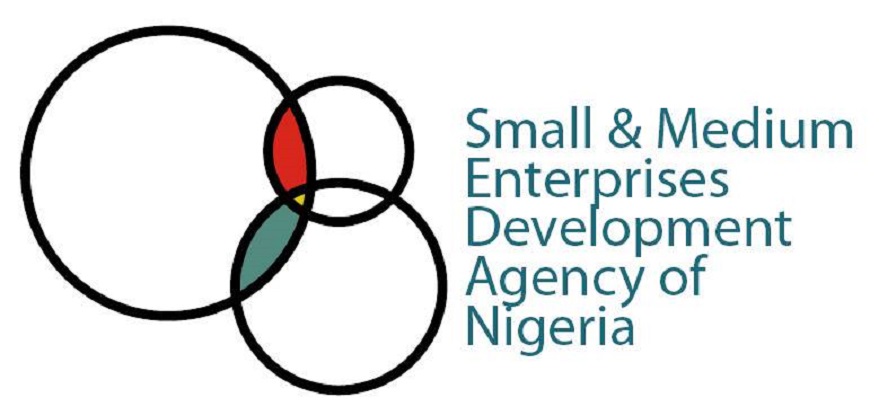General
Maritime Workers Reject Planned 50% Deduction in NPA Revenue

By Adedapo Adesanya
Maritime workers, under the aegis of the Maritime Workers Union of Nigeria (MWUN) and the Senior Staff Association of Statutory Corporations and Government-Owned Companies (SSASCGOC), in the Nigerian Ports Authority (NPA), have rejected an order from the Ministry of Finance directing 50 per cent deduction from the Internally Generated Revenue (IGR) of the NPA.
In a circular, the ministry had directed the port regulator to pay 50 per cent of its revenue into the federation account as part of efforts to raise more revenue.
In response, the labour group warned that such a move posed grave danger for port operations and development amongst others, and instead advocated for a 30 per cent IGR deduction.
The bodies called on President Bola Tinubu to intervene to avoid a looming industrial unrest over the issue.
The unions stated that if the 50 per cent is allowed to be, it will impact the constant dredging of the port channels, regular maintenance of the quay apron, maintenance of port jetties and terminals, manpower development discharge of its Corporate Social Responsibilities (CSR) and staff welfare.
The unions, however, recommended that 30 per cent of the agency’s IGR should be deducted while 70 per cent is left for it to take care of its overhead cost and statutory responsibilities.
The unions said: “We have carefully studied this circular especially as it relates to/affects the Nigerian Ports Authority and hasten to express our displeasure over same on the following grounds. Nigerian Ports Authority (NPA) is a self-funded Government Agency which receives zero allocation from the Government budget and taking a chunk of 50 per cent of its internally generated revenue will as a matter of fact stall or impede the effective discharge of its corporate responsibilities and the consequential effect of this will not be palatable.
“Our channels are probably the shallowest in the West Africa Sub-region, especially the Eastern Ports channels, they require constant dredging without which vessels cannot be easily plotted to berth, Dredging of the Ports channels require huge financial outlay.
“This will be pretty ditty to achieve when 50% of its internally generated revenue Is removed, The resultant effect will lead to ship owners diverting their vessels to our neighbouring countries where ease of doing business is provided.
“Almost all the ports quay aprons are in bad shape due to old age and they therefore constitute grave danger not only to men but also to equipment. We had at one time or the other expressed fear over the dilapidated condition of our port quay aprons.
“Maintaining and sustaining healthy quay aprons is capital intensive and if our quay aprons are this bad now, one can only imagine what the situation would look like when NPA Is denied 50 per cent of Its revenue. We need to be proactive as our neighbouring countries are very ready to capitalize on our inability to provide the required infrastructure to attract ship owners.
“Maintenance of ports, jetties and terminals is also capital intensive. Presently all the infrastructures in our Ports, Jetties and Terminals are in decrepit position, yawning for urgent repairs. How would they then look like when the Authority is denied 50 per cent of its internally generated revenue? The situation is better imagined than described.
“A healthy and well-trained workforce is a pre-requisite condition for improved productivity and efficient service delivery. Needless to say, port operations are specialised ones that require a well-trained workforce to compete favourably and take the lead to become the hub of maritime business in the West African sub-region. A 50 per cent deduction of NPA internally generated revenue will impede the attainment of this lofty dream.
“Nigerian Ports Authority operates in a hostile environment, especially in the Eastern axis (Niger Delta). Discharge of corporate social responsibilities over time has immensely doused their restiveness, and this has fostered a clement environment for the Authority and other stakeholders to operate.
“Automatic deduction of 50 per cent of its internally generated revenue shall leave the Authority, financially incapacitated to discharge these responsibilities to the host community which may lead them to resort to unhealthy activities.
“Staff welfare issues are issues that require urgent attention; failure of which usually leads to inclement industrial atmosphere. Automatic deduction of 50 per cent of revenue internally generated will incapacitate the Authority from prompt attendance to staff welfare matters which will lead to avoidable crises.
“Flowing from the above, we hereby reiterate our objection to the circular as it relates to the Nigerian Ports Authority.
“We recommend that 30 per cent of the revenue internally generated by the Authority could be automatically deducted whilst 70 per cent is left for the Authority to accomplish its overhead costs and statutory responsibilities, failure of which the Union would have no other option than to withdraw the services of its members from all port’s formations nationwide.”
General
SERAP Sues Tinubu Over Failure to Probe Missing N57bn

By Adedapo Adesanya
The Socio-Economic Rights and Accountability Project (SERAP) has filed a lawsuit against President Bola Tinubu for not probing allegations of N57 billion of public funds said to be missing, diverted or stolen from the Federal Ministry of Humanitarian Affairs and Poverty Alleviation in 2021.
The allegations were documented in the 2021 audited report released last month by the Office of the Auditor-General of the Federation.
Joined in the suit as respondent is the Attorney General of the Federation and Minister of Justice, Mr Lateef Fagbemi (SAN).
In the suit number FHC/L/MISC/876/2024 filed last Friday at the Federal High Court, Lagos, SERAP is asking the court “to compel President Tinubu to direct Mr Fagbemi to work with appropriate anti-corruption agencies to promptly probe allegations that over N57 billion of public funds are missing, diverted or stolen from the Federal Ministry of Humanitarian Affairs and Poverty Alleviation in 2021.”
It also asked the court “to compel President Tinubu to direct Mr Fagbemi to work with appropriate anticorruption agencies to prosecute anyone suspected to be responsible for the missing N57 billion, if there is sufficient admissible evidence, and to recover any missing public funds.”
In the suit, the group argued that, “Investigating the allegations and prosecuting those suspected to be responsible for the missing N57 billion and recovering the missing funds would end the impunity of perpetrators.”
“The allegations amount to stealing from the poor. There is a legitimate public interest in ensuring justice and accountability for these grave allegations.
“Poor Nigerians have continued to pay the price for the widespread and grand corruption in the Federal Ministry of Humanitarian Affairs and Poverty Alleviations and other ministries, departments and agencies [MDAs].”
“The consequences of corruption are felt by citizens on a daily basis. Corruption exposes them to additional costs to pay for health, education and administrative services.”
“The allegations also suggest a grave violation of the public trust, the Nigerian Constitution 1999 (as amended), the country’s anticorruption legislation and international anticorruption obligations,” the statement said in parts.
The suit filed on behalf of SERAP by its lawyers, Kolawole Oluwadare and Oluwakemi Agunbiade, noted that, “Granting the reliefs sought would go a long way in addressing corruption in ministries, departments and agencies [MDAs] and the country’s budget deficit and debt problems.”
“According to the 2021 annual audited report by the Office of the Auditor-General of the Federation, the Federal Ministry of Humanitarian Affairs and Poverty Alleviation, [the Ministry] in 2021 failed to account for over N54 billion [N54,630,000,000.00] meant to pay monthly stipends to Batch C1 N-Power volunteers and non-graduate trainees between August and December 2021,” the organisation said.
General
SMEDAN, Others to Help Small Business Owners Cut Costs

By Adedapo Adesanya
The Small and Medium Enterprises Development Agency of Nigeria (SMEDAN) is collaborating with Rolling Energy to convert 100,000 vehicles to Compressed Natural Gas (CNG) in 18 months as part of efforts to support small businesses struggling to navigate the tough operating environment.
The Director-General of SMEDAN, Mr Charles Odii, disclosed this at the unveiling of a CNG Conversion and Training Centre in Abuja, noting that another partner is Pi-CNG.
“This new centre is designed to convert vehicles to run on CNG, an affordable and environmentally friendly alternative to traditional fuels.
“With its capacity to convert nine vehicles daily and a dedicated team of 20 technicians, the centre will help SMEs reduce transportation costs and adapt to changing energy needs.
“It will also train young Nigerians in CNG conversion, maintenance, and repair, equipping them with practical skills and opening up new business opportunities,” he stated.
According to Mr Odii, the mandate of the Pi-CNG initiative is to roll out about one million converted cars in the next 18 months.
“We at SMEDAN are committing to taking 10 per cent of those cars to be converted at our centres,’’ he said.
He added that the project aligned with SMEDAN’s GROW Nigerian strategy, which focuses on providing SMEs with Guidance, Resources, Opportunities, and Workforce Support.
“By adopting CNG, we are helping SMEs cut costs while promoting sustainable energy practices. This effort is particularly timely as businesses face rising fuel costs following subsidy removal.
“SMEDAN is also committed to improving access to critical infrastructure for SMEs. We are upgrading Industrial Development Centres across the country to provide affordable tools and power tailored to the needs of small businesses,” Mr Odii said.
On his part, the Californian Secretary of Transportation, Mr Toks Omishakin, praised Nigeria’s efforts in adopting cleaner energy alternatives, such as CNG, but urged stakeholders to look beyond CNG and invest in long-term renewable solutions.
“I see a tremendous opportunity for collaboration between California and Nigeria in exploring renewable energy solutions like solar, wind, and hydrogen,” he said.
The Executive Vice Chairman of the Presidential CNG Initiative, Mr Toyin Zubair, commended SMEDAN and other stakeholders for their contributions, emphasising the need to harness Nigeria’s vast natural gas resources to drive the economy.
“Nigeria has one of the largest gas reserves in the world. By using this resource locally to power vehicles and industries, we can reduce costs and create a cleaner environment,” Mr Zubair said.
The chief executive of Rolling Energy, Mr Mubarak Danbatta, explained that the conversion process prioritised safety and affordability, making it accessible to SMEs.
“With less than N4,000, a vehicle can be fully fueled with CNG, compared to over N60,000 for petrol. This is a significant relief for businesses.
“CNG is not a business for the rich. It is a business for everyone. And the good thing is that this partnership is being done with SMEDAN and Pi-CNG for the benefit of SMEs,” Mr Danbatta said.
General
Lagos to Get New Building Code in 2025

By Adedapo Adesanya
The Lagos State Government has expressed its readiness to get a brand-new Building Code next year, to achieve the high-performance standards needed to make Lagos a sustainable and Smart City.
The government’s readiness was disclosed at the Lagos State Executive Council Retreat on the Domestication of the Lagos Building Code, organised by the Office of the Special Adviser on e-GIS and Urban Development, held at Ikeja GRA on Wednesday.
Speaking during the retreat, Lagos State Governor, Mr Babajide Sanwo-Olu emphasised the need for more collaboration among all the ministries and agencies in the built sector, to ensure the state development in line with global best practices.
He said the motive behind the Lagos Building Code is to have a building regulation that would make Lagos much more resilient.
“We (Lagos State Government) are the first to domesticate the National Building Code, which is the creation of the Federal Government. We are not doing anything outside the vision at the sovereign and sub-sovereign levels. But what is unique about our own is the fact that all the cabinet members see the need to have an input because it would be an outcome that would affect lives and different ministries and agencies.
“So, there is a need for everybody to have a say, and at the end of the day, collectively we will resolve to have a way.
“What we are trying to do is for Lagos State to do what is obtainable internationally: have a building regulation in which we have a standard of construction in design, manner of land use occupancy, and use of building materials, which we believe would eventually improve and help with health, safety, and occupancy issues.
“It is all about building sustainably, making Lagos a lot more resilient and able to absorb shock in the future and able to stand in the comity of developed cities and city-states as we see in various parts of the world,” he said.
The Special Adviser to the Governor on eGIS and Urban Development, Mr Olajide Babatunde, stated that the Lagos Building Code is to complement the existing regulatory framework and provide a comprehensive solution to the challenges of land use, physical development, and urban planning.
Mr Babatunde said the Lagos Building Code will regulate building control, planning permission, and address the issues of setbacks; take care of the safety and sustainability of the environment; and also prevent the collapse of buildings.
“We have been working on the domestication of the National Building Code, and by next year, we are going to have our own brand-new Lagos Building Code. We have worked with professional bodies and people from academia, market women, and the public in general, and through a participatory approach, we can come out with a document that is acceptable to everyone and useful to the entire state,” he said.
Also speaking, the Special Adviser to the Governor on Infrastructure, Mr Olufemi Daramola, described the Lagos State Building Code initiative by the Babajide Sanwo-Olu administration as the next step to Green Lagos that will enable the state to plan buildings properly and ensure durable infrastructure in the state.
During the retreat, members of the Lagos State Executive Council brainstormed and advocated aggressive sensitisation for residents of the State on the Lagos Building Code before implementation.
-

 Feature/OPED5 years ago
Feature/OPED5 years agoDavos was Different this year
-
Travel/Tourism8 years ago
Lagos Seals Western Lodge Hotel In Ikorodu
-

 Showbiz2 years ago
Showbiz2 years agoEstranged Lover Releases Videos of Empress Njamah Bathing
-

 Banking6 years ago
Banking6 years agoSort Codes of GTBank Branches in Nigeria
-

 Economy2 years ago
Economy2 years agoSubsidy Removal: CNG at N130 Per Litre Cheaper Than Petrol—IPMAN
-

 Banking2 years ago
Banking2 years agoFirst Bank Announces Planned Downtime
-

 Sports2 years ago
Sports2 years agoHighest Paid Nigerian Footballer – How Much Do Nigerian Footballers Earn
-

 Technology4 years ago
Technology4 years agoHow To Link Your MTN, Airtel, Glo, 9mobile Lines to NIN





















